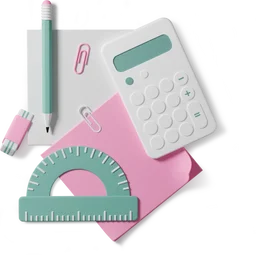Board exams can be one of the most challenging phases in a student’s academic life. The pressure to perform well often leads to stress, anxiety, and even burnout. However, with the right strategies, you can prepare effectively without compromising your mental health. Here's a step-by-step guide to help you ace your board exams stress-free.
1. Create a Realistic Study Plan
A well-organized study schedule is the foundation of stress-free exam preparation.
- Break it down: Divide your syllabus into manageable chunks and assign specific topics to each day.
- Prioritize subjects: Start with the ones you find difficult and gradually move to easier ones.
- Include breaks: Schedule short breaks every 40–50 minutes to refresh your mind and avoid burnout.
2. Start Early and Revise Regularly
Procrastination can lead to last-minute panic. Starting early gives you ample time to understand concepts and revise multiple times.
- Daily revision: Dedicate 15–20 minutes to revisiting topics you studied the previous day.
- Mock tests: Practice solving past question papers and sample papers to get a sense of the exam pattern.
3. Understand, Don’t Memorize
Cramming may work temporarily, but it doesn't lead to long-term retention.
- Focus on concepts: Try to understand the 'why' and 'how' behind every topic.
- Use mnemonics: For subjects like Biology or History, create acronyms or rhymes to remember key points.
- Teach others: Explaining topics to a friend or family member can deepen your understanding.
4. Manage Your Time Effectively
Time management is critical during both preparation and the exam itself.
- Set milestones: Aim to complete certain portions of the syllabus by specific dates.
- Stick to the schedule: Avoid distractions like excessive screen time on social media.
- Practice time-bound writing: Solve sample papers within the allocated time to improve speed and accuracy.
5. Take Care of Your Health
Your body and mind need to be in top condition for optimal performance.
- Eat right: Include brain-boosting foods like nuts, fruits, and leafy greens in your diet.
- Sleep well: Ensure you get 7–8 hours of sleep every night. It improves memory and focus.
- Exercise regularly: Simple activities like walking, yoga, or stretching can reduce stress and improve mood.
6. Stay Positive and Motivated
A positive mindset can make a world of difference in how you approach your exams.
- Avoid comparisons: Focus on your preparation instead of comparing yourself to others.
- Celebrate small wins: Completing a chapter or scoring well in mock tests deserves a reward!
- Visualize success: Picture yourself performing well in the exams—it boosts confidence.
7. Seek Help When Needed
If you're struggling with a particular subject or topic, don’t hesitate to ask for help.
- Consult teachers: They can clarify doubts and provide valuable tips.
- Join study groups: Collaborating with peers can help you learn faster.
- Use online resources: Platforms like YouTube, ed-tech websites, or StudifySuccess can offer simplified explanations and practice material.
8. Practice Mindfulness
Incorporating relaxation techniques into your routine can help reduce anxiety.
- Meditation: Spend 5–10 minutes meditating daily to calm your mind.
- Deep breathing: Use this technique to regain focus during stressful moments.
- Listen to music: Play soothing tunes to relax during study breaks.
9. Stay Organized
Keeping your study materials in order can save time and reduce stress.
- Declutter your space: A clean study area enhances concentration.
- Use tools: Organize notes, flashcards, or digital apps to keep track of your syllabus and deadlines.
10. Prepare Strategically for Exam Day
A calm and collected approach on the exam day is essential.
- Pack early: Keep your admit card, stationery, and other essentials ready the night before.
- Revise lightly: Go through key formulas, dates, or summaries instead of cramming new information.
- Arrive early: Reach the exam center ahead of time to avoid unnecessary stress.
Final Thoughts
Board exams are important, but they don’t define your entire life or potential. Preparing with a structured plan, a positive mindset, and self-care can help you face them confidently and stress-free. Remember, success comes to those who stay consistent and believe in themselves.
For additional resources and expert-led classes to help you excel, check out Studifysuccess Classes.














 Error
Error






